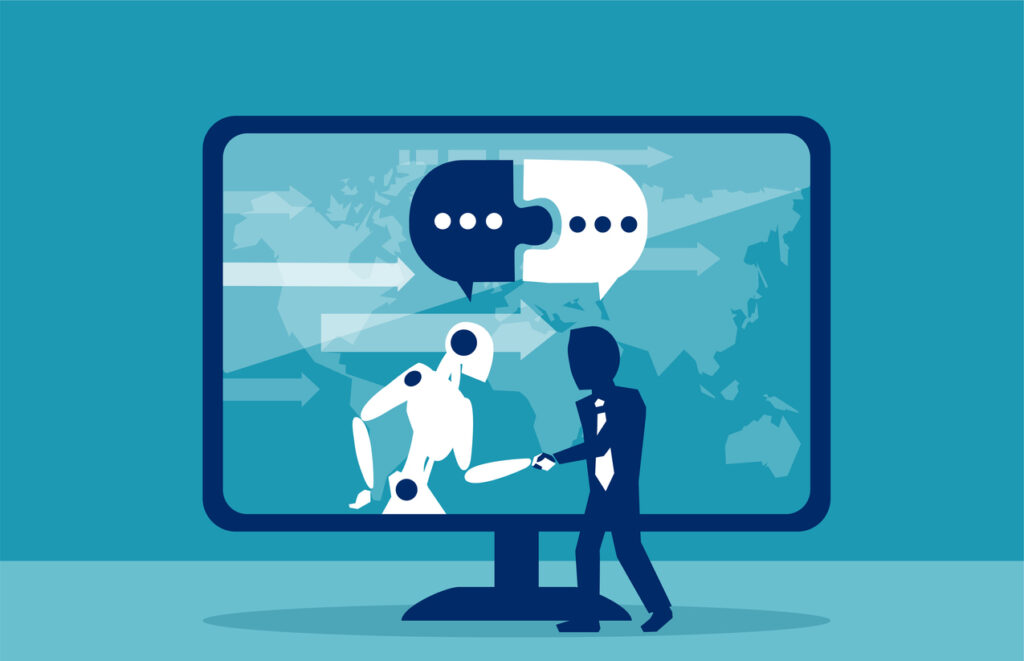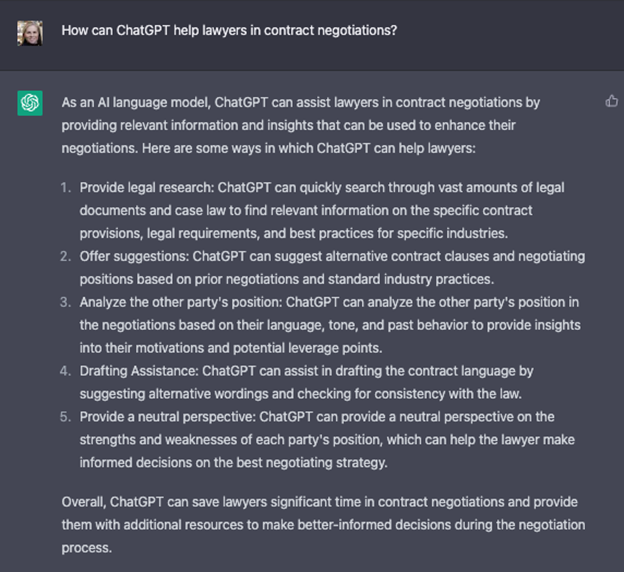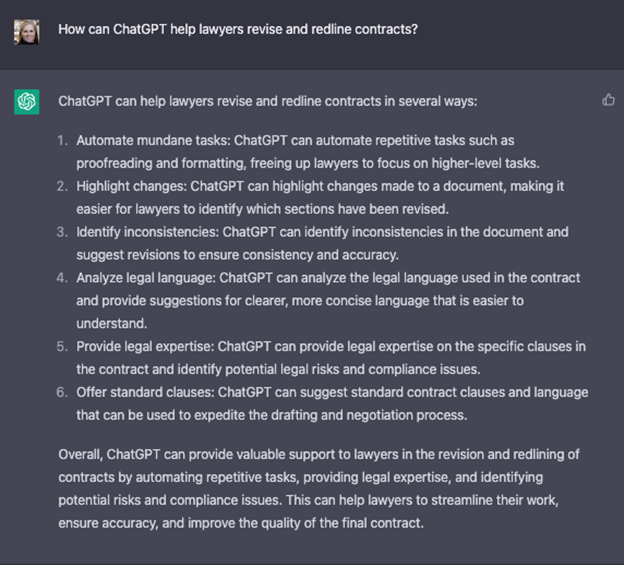KEY POINTS:
- ChatGPT can be used in contract negotiations to validate reasoning, provide additional arguments, draft clear explanations, and create playbooks.
- The key to successfully using ChatGPT during contract negotiations is quality prompting.
- Be cautious of security and confidentiality risks when using ChatGPT with contracts.

Generative AI and large language models, such as ChatGPT, can help lawyers become more efficient and effective advisors. But how can this new technology help us negotiate contracts?
This column – Chatting Contracts with GPT – will address this question in a series of articles documenting my attempts to use ChatGPT during contract negotiations.
I will use real-life scenarios and show my conversations with ChatGPT from creating different prompts to analyzing the resulting responses. Each series will deep dive into a different part of the contract negotiation process. Together, we can learn how contracts professionals can leverage ChatGPT to optimize our legal practice.
In this article, I provide an overview of how ChatGPT can help us busy lawyers and contracts professionals negotiate contracts more efficiently, plus some risks and limitations to keep in mind when using this technology in a transactional setting.
The Key to Using ChatGPT in Contract Negotiations
As general counsel of an international scale-up with limited resources, I have recently used ChatGPT to enhance my arguments in contract negotiations. This has dramatically increased my productivity.
I found the key to successfully leveraging ChatGPT during contract negotiations is quality prompting. When asking ChatGPT a question, you’ll need to be as explicit and as detailed as possible. Indicate the format of a response (i.e. email, contract, explanatory note, etc.) and the audience.
Remember ChatGPT is a chat application – meaning it is intended to mirror a human conversation. You can work with it to deep dive into certain topics, ask for clarifications, and request citations to the sources of data or re-drafts in different styles or tones. Experiment and try different prompts on the same topics to see different results. I am a ChatGPT Plus subscriber, so I also switch between version 3.5 and 4.0 to see how the responses vary.
I also find it helpful to request that answers be condensed into one sentence or paragraph. I refrain from entering entire contracts and make sure to sanitize information before inputting it into ChatGPT due to the confidentiality and security concerns highlighted above.
The Different Ways You Can Use ChatGPT in Contract Negotiations
You can use ChatGPT in contract negotiations to:
- Input a clause and short hypothetical and ask it to suggest revisions.
- Respond to proposed revisions and provide justifications for your revisions.
- Ask for recommendations for the best language to achieve your objectives in revising clauses or sections of an agreement.
- Summarize a super lengthy paragraph that you would normally have to manually parse to understand the intent and its impact.
- Compare what appear to be conflicting clauses and provide an analysis of how the clauses work together.
- Understand what is standard in certain types of contracts and certain industries, and request supporting explanations and data.
- Summarize legislation to pinpoint what is critical and why a party would want to exclude or include it from the contract.
- Get data or instructions on how to get data to support your arguments.
- Understand the other side’s arguments and request responses on your behalf.
- Quickly research and identify a statute or regulation and its definition to determine whether a particular regulation or statute applies to our business.
- Check for typos and grammatical errors, and remove legalese.
Of course, I asked ChatGPT how it could help: (i) in contract negotiations and (ii) revise and redline contracts. Here’s what it had to say:


Confidentiality and Security Risks to be Aware of When Using ChatGPT with Contracts
What makes ChatGPT accessible and arguably more attractive to lawyers is that it is a natural language processing tool. It allows users to have human-like conversations. It can answer questions and assist with tasks such as composing emails, summarizing complex topics, providing both sides of an argument, and writing code to build a simple form for the intake of legal tasks.
But, it is important to remember the tool is only as good as the information on which it was trained. It is not perfect. It has bias built into it. The more a topic has been written about, the more information ChatGPT has about it, which, in theory, makes the output more reliable. On the other hand, its output can be less reliable for more esoteric topics such as data privacy laws.
Plus, ChatGPT 3.5’s training data is limited to 2021, and it cannot search the internet (ChatGPT recently launched a browser plugin).
Additionally, there are security and data privacy concerns and lawyers should be careful not to input attorney-client privileged communications at the risk of violating the rules of professional ethics. On the same token, contracts professionals should not input confidential information into ChatGPT because they may be in breach of a contractual agreement not to share such information. In fact, Italy recently banned ChatGPT due to a data breach involving user conversations and payment information, as well as the inability to verify the age of users.
Given these caveats, I recommend using ChatGPT with the expectation that someone will read your conversation. Do not include any personal data, confidential information, or privileged communications in your prompts.
I’m excited to see where these technological advances can take us–provided that there is the right oversight, ethics and regulation in place.
For more expert tips about using ChatGPT with contracts:
- Read more articles in the author’s guest column Chatting Contracts with GPT
- Follow Laura on LinkedIn and reach out to her if you want customized trainings for your legal team
- Subscribe to the Contract Nerds newsletter for weekly tips about contracts straight to your inbox ????????

















